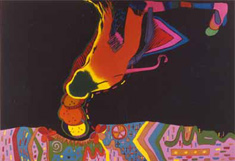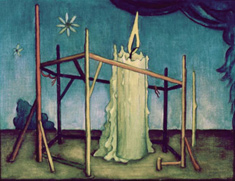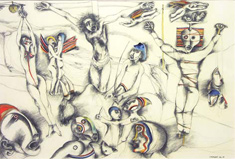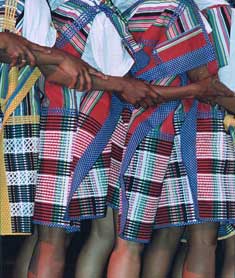A major blow
In small, inadequate, and frequently inappropriate spaces all over the country, dance began to burgeon and, as did theatre in its early days, to need a more professional platform. Sichel, together with a fellow critic and writer, Marilyn Poole, saw the need for "neutral space".
"We knew that a lot of the choreographers didn't have money, there needed to be a space where there could be a professional platform to show work, meet other dancers, work under professional conditions." One of the first to make a "leap of faith" and join them was Soweto Dance Theatre's Carly Dibokwane, who was to become an important force in bringing dance out of the townships and into "town".
As a result of their efforts, Dance Umbrella was born in 1989, and "Afrofusion", became public property. Out of Dance Umbrella grew a contemporary repertory which now is performed internationally.
Ironically, though, just as contemporary dance began to become a respectable sector of the theatre
scene, and as dance schools began to turn out professionals, the curtain came down on government funding of dance, and companies like the PACT (Performing Arts Council of the Transvaal) Dance Company (a contemporary company) were forced to close. Youngsters trained to high levels have found themselves with nowhere to go.
The blow fell just as South African dance was beginning to make a major impression internationally, and the country was reaping the benefits of local dancers, like the PACT Dance Company's Christopher Kindo, returning from training abroad to start new companies, collaborate with older ones, and impart their skills and creativity to their compatriots, redefining contemporary dance in Africa, and attaining worldwide recognition.
South Africa is a major force in the dance world "but the country doesn't recognise it," says Sichel. "Dance is one of the few things in this country that has done all the cross cultural reconciling but it needs a careful
infrastructure and policy which these young pioneers have to sort out.
SAinfo reporter
 Man from Space by Walter Battiss
Man from Space by Walter Battiss
 The Candle by Alexis Preller
The Candle by Alexis Preller
 Persecution of the Good by Cecil Skotnes
Persecution of the Good by Cecil Skotnes
 Afrofusion combines the techniques of formal dance training with a spirit that is purely African
Afrofusion combines the techniques of formal dance training with a spirit that is purely African



